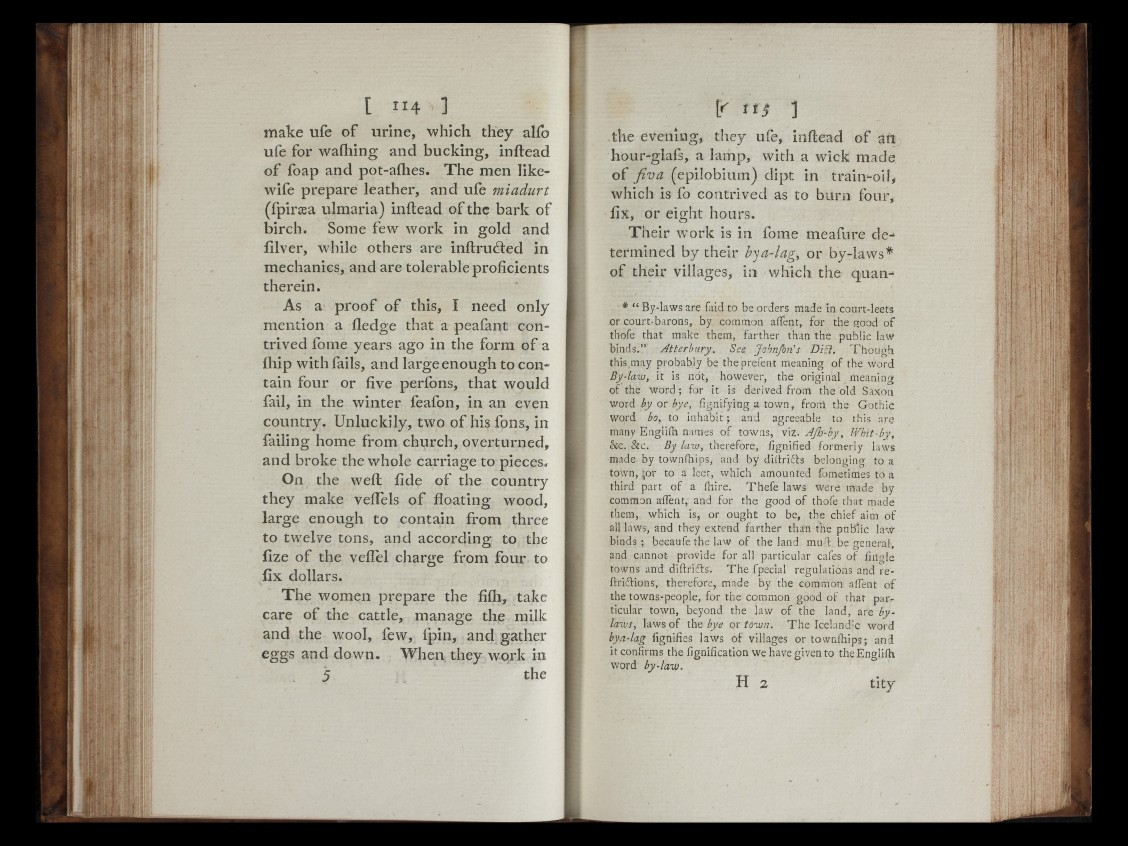
f
make ufe o f urine, which they alfo
ufe for wailiing and bucking, inftead
o f foap and pot-afhes. The men likewife
prepare leather, and ufe 7niadurt
(fpirsea ulmaria) inftead of the bark of
birch. Some few work in gold and
iilver, while others are inftrufled in
mechanics, and are tolerable proficients
therein.
As a proof o f this, I need only
mention a fledge that a peafant contrived
fome years ago in the form o f a
fliip with fails, and large enough to contain
four or five perfons, that would
fail, in the winter feafon, in an even
country. Unluckily, two o f his fons, in
failing home from church, overturned,
and broke the whole carriage to pieces.
On the weft; fide o f the country
they make vefTels o f floating wood,
large enough to contain from three
to twelve tons, and according to the
iize o f the veflel charge from four to
fix dollars.
The women prepare the fifli, take
care of the cattle, manage the milk
and the wool, few, fpin, and gather
eggs and down. When they work in
5 the
f
■'V''
the eveniag, they ufe, inftead o f an
hoLir-glafs, a lamp, with a wick made
o f fiva (epilobium) dipt in train-oil,
which is fo contrived as to burn four,
fix, or eight hours.
Tiieir work is in fome meafure determined
by their hya-lag, or by-laws*
of their villages, in which the quan-
* “ By-laws are faid to be orders made in court-Ieets
or court-baroiis, by common aflent, for the good of
thofe that make them, farther than the public law
binds.” Atterbury. See. Johnfons Diet. Though
this may probably be the prefent meaning of the word
By-law, it is not, however, the original meaning
of the word; for it is derived from the old Saxon
word ¿y or ¿yc, fignifying a town, from the Gothic
word bo, to inhabit; and agreeable to this are
many Englifn names of towns, viz. AJh-by, Whit-by,
k c. See. By law, therefore, fignified formerly laws
made by townfliips, and by diflriifts belonging to a
town, ;or to a leer, which amounted fometimes to a
third part of a fliire. Thefe laws were made by
common aflent, and for the good of thofe that made
them, which is, or ought to be, the chief aim of
all laws, and they extend farther than the public law
binds; becaufe the law of the land mud be general,
and cannot provide for all particular cafes of Angle
towns and diftrifts. The fpecia! regulations and re-
ftriftions, therefore, made by the common aflent of
the towns‘ people, for the common good of that particular
town, beyond the law of the land, are bylaws,
laws of bye ox town. The Icelandic word
bya-lag iignifies laws of villages or townfhips; and
it confirms the fignification we have given to the Englifh
word by-law.
H 2 tity